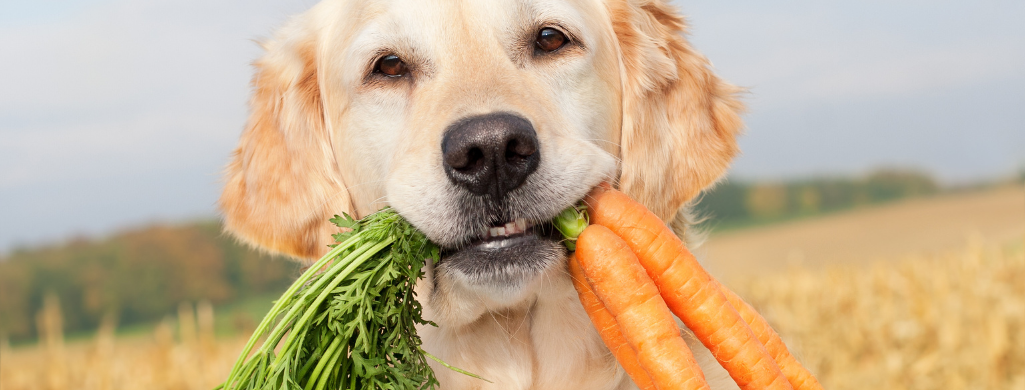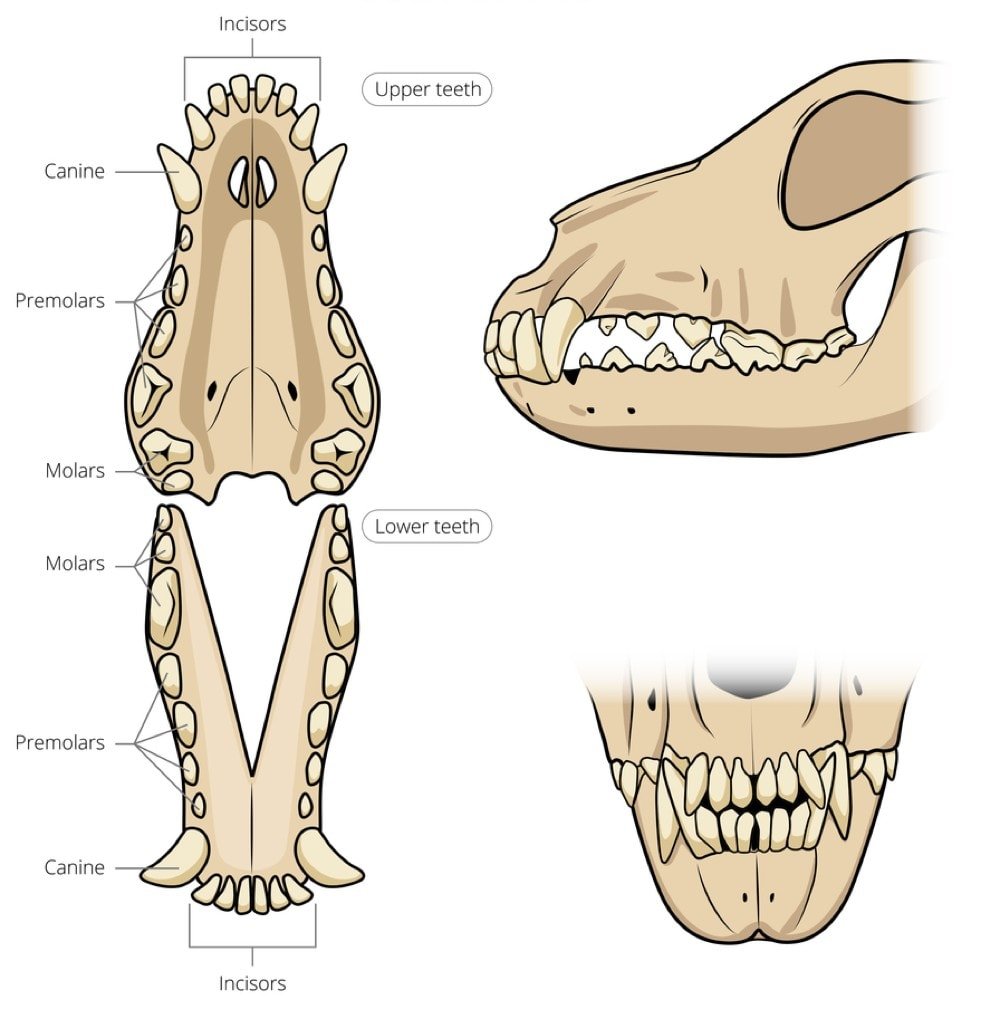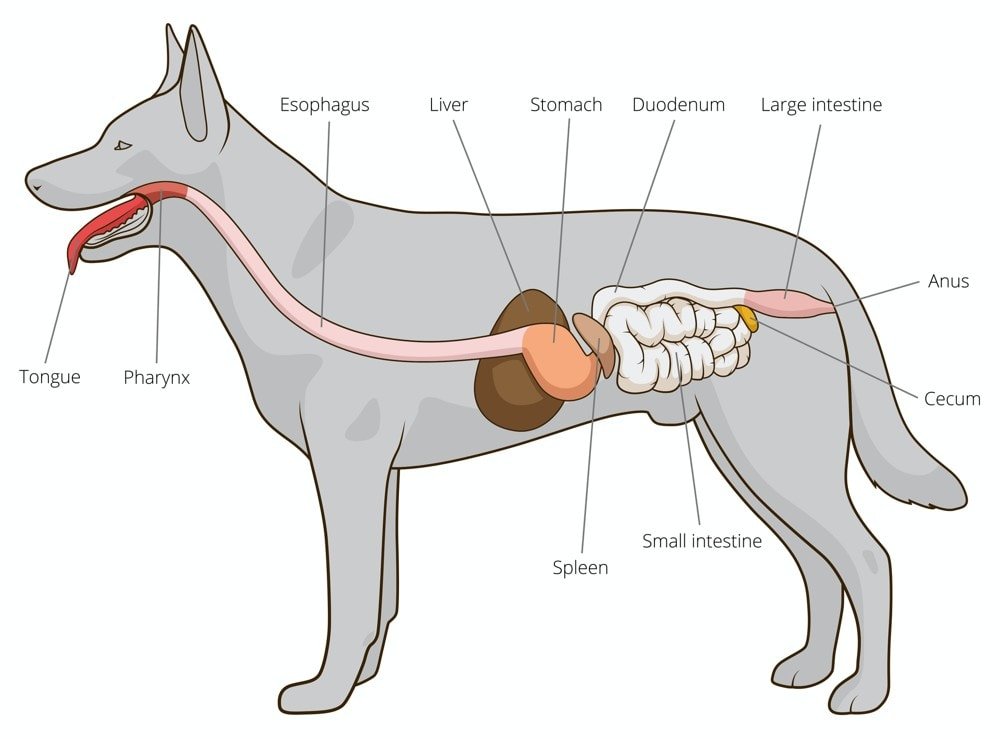
Are dogs omnivores? The short answer is yes. Read the article to find out why!
We’ve all heard that dogs come from wolves… And that’s true!
Even if it’s hard to imagine when I look at my giant ball of fluff napping in her natural habitat, the couch.
And wolves are carnivorous… so my dog must be carnivorous.
Right?
Well, the answer is not that simple.
As a biology student and vet technician, I’ve had the opportunity to study this subject in-depth with expert scientists and veterinarians.
The short answer is that dogs adapted to living with humans by becoming omnivores, but if you want the full explanation, keep reading.
What are Omnivores?
Omnivores are animals that can eat a variety of food sources, including both meat and plants. [1]
Take a look at your dinner plate, and you will find the perfect example of an omnivorous diet.
But, are dogs omnivores?
Most humans enjoy eating both animal products and plant-based foods. So, we may impose a similar diet on our companion animals without much thought.
Yet, many believe that dogs are carnivores because wolves, their ancestors, eat meat.
Dogs and wolves have many similarities. But a few distinctions allow dogs to eat a very different diet from their ancestors.
Wolves are True Carnivores
Animals can fall into two other groups based on their diet, herbivores and carnivores.
Herbivores eat only plants.
Examples of herbivores include horses and cattle. These animals have lengthy digestive tracts that can digest fibrous plant matter. [2]
True carnivores include animals that must eat meat to survive.
Their gastrointestinal systems cannot digest plants. But, they may still eat them sometimes. [3]
Modern dogs are direct descendants of wolves, a prime example of a true carnivore.
Wolf ecology research shows that they do not eat plants often. Instead, they hunt other animals as their primary food source. [4]
Since hunting success varies, wolves live a lifestyle of ‘feast and famine.’ Some days packs can gorge themselves on a large kill. But they often go for extended periods without food.
Adaptive Metabolism
To cope with variable nutrient intake, wolves developed an adaptive metabolism. This unique trait enabled wolves to eat big meals and survive during times of starvation.
The ability still influences our dogs today. Their ability to thrive on different amounts of food allowed them to eat different kinds of food.
Why Dogs are Omnivores?
Man domesticated dogs between around 15,000 years ago. Living with humans presented new niche opportunities for canines. [4]
Domestication of other animals such as cats also occurred. But, most experts agree that domestic cats are still true carnivores. [5]
A critical difference between the two species is dogs’ adaptive metabolism. Adaptability lets dogs thrive on the special diet offered in human society.
These traits inherited from their carnivore ancestors allowed dogs to become omnivores. As omnivores, they could benefit the most from domestication.
Evidence of omnivorous ability is clear when you compare dogs to true carnivores. As a total biology nerd, I love learning more about the unique adaptations of my pup.
Dentition

Chewing is the first step in the digestive process. Dentition, or the arrangement of teeth, is a good clue about what foods may be suitable for dogs to consume.
Carnivores must have sharp canines that allow them to shear meat off of prey. We all know dogs have a set of sharp front teeth suitable for eating meat.
They also have flat molars in the back of their mouth that can crush plants before digestion. [6]
Crushing is critical for digesting plants. Smaller particles allow for more efficient absorption of nutrients from starchy sources.
Gastrointestinal System
You can learn a lot about an animal’s diet by examining its gastrointestinal system. This system of organs works together to digest food.
Plant material contains complex materials that are difficult to digest. These materials include cellulose and tough starches.
To digest plant-based food, animals need a specialized gastrointestinal system. For example, herbivores who eat grass have complex hindguts to digest it.

Intestinal Length
Meat is easier to consume, and true carnivores have simpler digestive systems. Short intestinal tracts mean a faster digestion time for meat-eaters.
Intestine length varies little between dogs and wolves. But a dogs’ small intestine occupies 8% more gastrointestinal volume than that of cats. [7]
This increased volume allowed dogs to better adapt to digesting plants. Today, cats remain carnivores, while dogs thrive on omnivorous diets.
But, the most vital gastrointestinal adaptations in dogs involve starch digestion. The simple digestive tracts of carnivores cannot breakdown the material.
Digestive Enzymes
Enzymes are proteins that help speed up chemical reactions. Amylase is a valuable enzyme that helps breakdown complex starches.
Human and omnivore saliva contains this enzyme. This saliva begins breaking down starch when omnivores chew plant material.
While drool may not contain this vital tool, dogs do excrete amylase from their pancreas. This allows them to digest starch in their gut, unlike true carnivores. [8]
Genetic Adaptations
The foundation of this unique ability to produce amylase comes from genetic adaptations.
These changes differentiate man’s best friend from the wild’s top predator.
Genetic analysis revealed that over 100 genes changed during the evolution of dogs. [9] Evolution occurs when genetic changes provide advantages for an animal’s survival.
The genetic difference between species and their evolution is my favorite biology subject!
Most differences between dogs and wolves involve traits beneficial for living with humans.
Several of these genes involve the brain. These are the genes responsible for behavioral changes important for domestication.
Yet, significant differences also affected the genes involved in starch digestion. Dogs have 4 to 30 copies of the amylase gene, while wolves only have two copies. [10]
This means dogs produce more amylase than wolves. As a result, domestic dogs can digest starch better than their ancestors.
Nutrient Availability
Dogs also have a better ability to synthesize certain amino acids and vitamins. Their bodies can create specific nutrients from their components.
Most carnivores rely on eating these nutrients in their final form from food. Their bodies cannot produce them using different elements provided by their diet.
For example, dogs have enzymes that allow them to produce the amino acid taurine. Amino acids are fundamental building blocks of protein.
Cats lack these enzymes. They must consume essential amino acids from the meat protein in their diet. [11]
Dogs can also convert plant-based sources of essential fatty acids to use them in their body. [12]
Many carnivores do not have the enzymes used in these conversions.
What Dogs Should Eat?
Dogs may descend from true carnivores. But their feeding preferences today make them opportunity omnivores.
Domestic dogs evolved the ability to digest and use nutrients from plant-based sources. Yet, your furry friend likely still demonstrates a preference for meat.
I know what my dog would do when presented with a choice between a carrot and a hamburger.
What is the best diet for dogs?
The best diet for your dog will vary depending on your individual pup’s needs.
Every dog has specialized needs to consider when formulating the ideal diet. But all excellent dog food provides nutrients from high-quality sources. These sources can include meat, vegetables, fruits, or whole grain.
Ensure that whatever diet you choose for your dog provides adequate nutrition. Work with your veterinarian to determine how to avoid nutritional deficiency.
Select food that offers broad-spectrum nutrition from various high-quality ingredients. [13]
By avoiding excess processing, you set your dog up for a healthy life.
Can dogs eat grains?
Examples of grains include rice, wheat, and oats. Any savvy dog food shopper will notice advertisements for high-end, grain-free formulas. You may even feel guilty for feeding a brand that contains grain.
Unfortunately, the FDA has revealed that specific grain-free diets may cause heart problems. [14]
Some owners have reported allergic reactions to wheat. But grain sensitivity is rare in dogs. [15]
The starch found in grain is safe for dogs to digest. But, you should be selective when feeding dog food that contains grain.
The best options use whole grain to provide a high level of concentrated nutrition. Dogs can eat grains, but make sure the food is part of a balanced diet with diverse ingredients.
Is a vegetarian or vegan diet healthy for dogs?
Feeding your pet a vegetarian or vegan diet can elicit strong responses.
Vegan diets can cause health problems without input from a knowledgeable veterinary nutritionist.
Although possible, it is incredibly difficult to provide a balanced ratio of essential vitamins and minerals with this approach. [16]
Because vegetarian diets are more challenging to develop than traditional diets, they require professional guidance. If you are interested in vegan alternatives for dogs, talk to your veterinarian first about healthier options.
The Bottom Line
Dogs are omnivores.
Digestive adaptations allow dogs to enjoy the varied diet provided by human society.
My dog’s ancestors were apex predators. Today, my Great Pyrenees enjoys an occasional veggie snack.
Read more about healthy human foods for your omnivorous companion, and work together with your veterinarian to develop an individualized diet for your pup.

